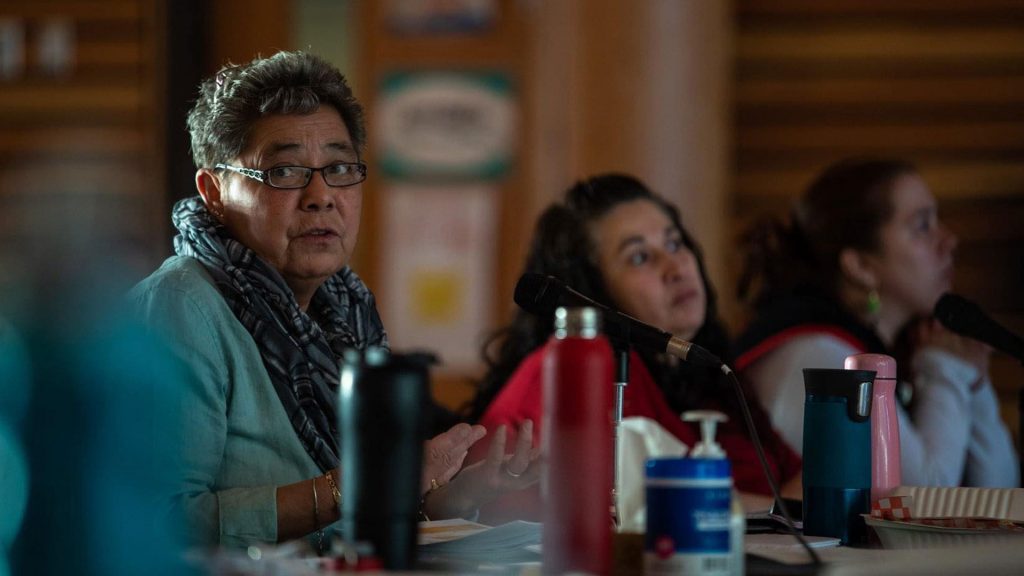
C/TFN Haa shaa du Hen (Chief) Lynda Dickson. Dickson says the rural Yukon community is grappling with an addictions and mental health crisis. (Photo: C/TFN Facebook)
The Carcross/Tagish First Nation (C/TFN) in Carcross, Yukon, has declared a state of emergency after three citizens died last week from drug related deaths.
In a release from Jan. 12, the First Nation states the declaration “was made with strong support by the community following the news of three drug-related fatalities impacting the community within the first week of the new year.”
Haa shaa du Hen (Chief) Lynda Dickson says the deaths have been “tragic” in the small community of around 300 people 70 kilometers south of Whitehorse.
“To lose three members to drug overdoses within the first week of 2022, it really hit home to our citizens,” she says.
“Our hearts go out to the three families that have lost their loved ones. It’s important to acknowledge them.”
Dickson says like many other rural areas in Yukon, Carcross has been affected by the territory’s addictions crisis, and community members felt it was time to take action.
“We feel like something needs to happen in Yukon and Canada. It’s not unique to our small community, it’s Canada-wide,” she says.
An emergency community meeting was held in Carcross on Jan. 7, which generated a need for “coordinated, community-led approaches, collaboration with other Yukon First Nations and orders of government, and a desire to cultivate in-community services and supports,” the press release states.
Dickson says the declaration was made to guarantee more funding and supports from the territorial and federal governments, as well as to raise awareness about addictions.
“We want preventive care, we’re looking at some kind of aftercare (as that’s) also needed in the Yukon. We need to be able to have more naloxone kits and more test strips just be readily available,” she says.
Although the community is around an hour away from Whitehorse, Dickson says it’s not always easy for people in Carcross to go there and access supports.
“When you’re so close to Whitehorse, it’s easy for people to say ‘well the treatment will be in Whitehorse,’ when sometimes people don’t have the ability to go to town. They might not have a vehicle, so we might need those services here in the evenings instead of people having to go to Whitehorse,” she says.
C/TFN’s health and wellness department, the territory’s mental wellness and substance use services and Whitehorse harm reduction group BloodTies Four Directions will be providing overdose awareness in the community until Jan. 26.
The team will be going door-to-door to provide information, resources and harm reduction materials like naloxone kits and fentanyl testing.
C/TFN says it will also be supporting other initiatives to promote awareness, sobriety and harm reduction practises.
Community members taking action

Lyndsay Amato, a C/TFN citizen who now lives in Whitehorse, says she supports the declaration and is pleased to see her First Nation drawing attention to the issue.
She adds addictions and mental health issues are greatly impacting the community.
“I myself am struggling with depression and anxiety, many of my friends and family are feeling the same way. There’s a general heaviness across the community,” she says.
Amato says while she’s aware that Carcross does have access to some supports, such as counselling, she notes it’s not as extensive as what’s provided in Whitehorse, such as access to BloodTies and the territory’s only supervised consumption site.
“Out in the communities the resources just aren’t enough and the opportunities, they’re not happening out there for our people. We need more opportunities for people to reach out and say, ‘we need help.’”
That’s why she’s helping plan a march and vigil event on Jan. 15 that will take place in a handful of Yukon communities to draw attention to the territory’s addictions and mental health crisis.
“We’re all going to get together in each of those communities and have a vigil in memory of the people that we’ve lost, the people that still suffer, and to raise awareness that our communities are suffering and they need help,” she says.
“They need more resources and the government needs to step up for us. They need to step up for our Indigenous communities, especially.”
At a COVID-19 press conference on Jan. 12, Tracy-Ann McPhee, Yukon’s health and social services minister, said she couldn’t offer an official response on the declaration, though she did say she supported the First Nation’s decision.
She also noted the community’s MLA, John Streicker, was in contact with C/TFN and the community about the crisis.
“We have been working with many communities across the territory with respect to the opioid crisis, concerns about mental health and addictions, alcohol and drug use, and we’ll continue to do so,” McPhee said.
Late last year the territory’s chief coroner announced Yukon is currently leading Canada in opioid deaths per population of 100,000. As of November 2021, 54 people have died in the territory from the illicit use of opioids since 2016.










